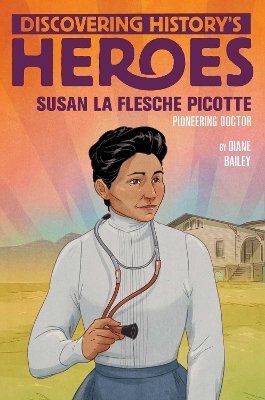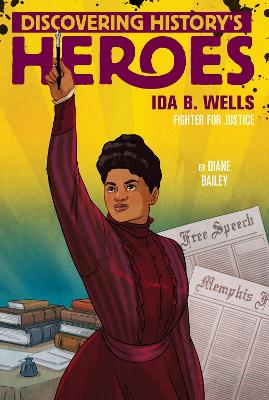Jeter Publishing
2 total works
Jeter Publishing presents a series that celebrates men and women who altered the course of history but may not be as well-known as their counterparts. In this middle grade biography, learn about Susan LaFlesche Picotte, the first Native American woman to earn a medical degree.
Susan LaFlesche Picotte was the first Native American doctor in the United States and served more than 1,300 patients over 450 square miles in the late 1800s.
Susan was the daughter of mixed-race (white and Native American) parents, and struggled much of her life with trying to balance the two worlds. As a child, she watched an elderly Omaha Indian woman die on the reservation because no white doctor would come help. When she grew older, Susan attended one of just a handful of medical schools that accepted women, graduating top of her class as the country’s first Native American physician.
Returning to her native Nebraska, Susan dedicated her life to working with Native American populations, battling epidemics from smallpox to tuberculosis that ravaged reservations during the final decades of the 19th century.
Blizzards and frigid temperatures were just part of the job for Susan, who took her horse and buggy for house calls no matter what the weather conditions. Before her death in 1915, she also established public health initiatives and even built a hospital.
Susan LaFlesche Picotte was the first Native American doctor in the United States and served more than 1,300 patients over 450 square miles in the late 1800s.
Susan was the daughter of mixed-race (white and Native American) parents, and struggled much of her life with trying to balance the two worlds. As a child, she watched an elderly Omaha Indian woman die on the reservation because no white doctor would come help. When she grew older, Susan attended one of just a handful of medical schools that accepted women, graduating top of her class as the country’s first Native American physician.
Returning to her native Nebraska, Susan dedicated her life to working with Native American populations, battling epidemics from smallpox to tuberculosis that ravaged reservations during the final decades of the 19th century.
Blizzards and frigid temperatures were just part of the job for Susan, who took her horse and buggy for house calls no matter what the weather conditions. Before her death in 1915, she also established public health initiatives and even built a hospital.
Jeter Publishing presents a brand-new series that celebrates men and women who altered the course of history but may not be as well-known as their counterparts.
Ida B. Wells was an African-American journalist and activist who led an anti-lynching crusade in the United States in the 1890s.
On one fateful train ride from Memphis to Nashville, in May 1884, Wells reached a personal turning point. Having bought a first-class train ticket, she was outraged when the train crew ordered her to move to the car for African Americans. She refused and was forcibly removed from the train—but not before she bit one of the men on the hand. Wells sued the railroad, winning a $500 settlement. However, the decision was later overturned by the Tennessee Supreme Court.
This injustice led Ida B. Wells to pick up a pen to write about issues of race and politics in the South. Using the moniker “Iola,” a number of her articles were published in black newspapers and periodicals. Wells eventually became an owner of the Memphis Free Speech and Headlight, and, later, of the Free Speech.
She even took on the subject of lynching, and in 1898, Wells brought her anti-lynching campaign to the White House, leading a protest in Washington, DC, and calling for President William McKinley to make reforms.
Ida B. Wells never backed down in the fight for justice.
Ida B. Wells was an African-American journalist and activist who led an anti-lynching crusade in the United States in the 1890s.
On one fateful train ride from Memphis to Nashville, in May 1884, Wells reached a personal turning point. Having bought a first-class train ticket, she was outraged when the train crew ordered her to move to the car for African Americans. She refused and was forcibly removed from the train—but not before she bit one of the men on the hand. Wells sued the railroad, winning a $500 settlement. However, the decision was later overturned by the Tennessee Supreme Court.
This injustice led Ida B. Wells to pick up a pen to write about issues of race and politics in the South. Using the moniker “Iola,” a number of her articles were published in black newspapers and periodicals. Wells eventually became an owner of the Memphis Free Speech and Headlight, and, later, of the Free Speech.
She even took on the subject of lynching, and in 1898, Wells brought her anti-lynching campaign to the White House, leading a protest in Washington, DC, and calling for President William McKinley to make reforms.
Ida B. Wells never backed down in the fight for justice.

